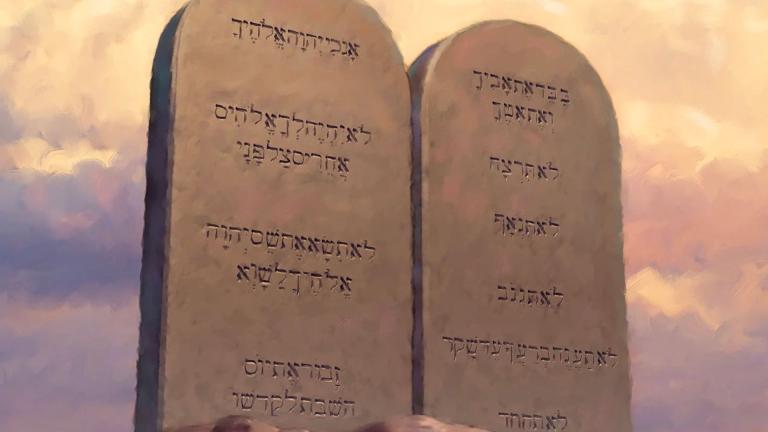
So, I did a Google search on “Why Christians should not do social justice” and, yes, I was grieved at the results.
Folks, what do you think the 10 Commandments are about?
I’ll tell you: They are about creating a just society.
Heaven and Earth
Let me begin by starting at ground zero: the resurrection of Christ is one of the cardinal doctrines of the Church (1 Cor 15:3-8). In 1 Corinthians 15, Paul notes that Jesus’ resurrection is “the first fruits of those who are asleep” (1 Cor 15:20). The point is that Christ was first and we shall follow!
Romans 8 even adds that the whole creation longs for the day of our resurrection (Rom 8:19-22) because it is then that “the creation itself also will be set free from its slavery to corruption” (Rom 8:21).
Our hope is in the resurrection. It is not in some disembodied, escapist theological conviction about going to heaven when we die.
The book of Revelation is clear: Heaven comes down (Rev 21:2). Sure, we may “go up” if we die in the interim. But the interim is not the eternal.
The eternal is when heaven and earth become one.
I begin with this because those who argue against doing justice too often contend that the only thing that matters is our spirituality.
Christians and Justice
A question I heard often in my Baptist upbringing was, “Do the 10 Commandments apply to us today?”
Really? Seriously? The question itself shows a fundamental lack of understanding of the Bible.
Not only was this question really asked, but there was a real debate about it. Some actually argued that the 10 Commandments do not apply for us today. Others conceded something along the lines of, “Well, if a command is reiterated in the NT, then it still applies!”
Go ahead, do your own Google search. Even today, there are all kinds of websites out there claiming that the 10 commandments do not apply any longer. (I won’t give any links here because I do not want to acknowledge them).
The 10 Commandments were designed to establish a just society
Of course, the fundamental difference between the people of God today and those prior to Christ is that we are now comprised of persons from all nations.
This does not mean, however, that we are not to work towards establishing a just society. It does mean that we are not to do so as an empire.
NB: this is why the Christianizing of the empire during the time of Constantine (AD 325) created as many problems as it resolved.
It also means that working towards a just society is going to cost us something. After all, those in power do want just societies.
At the same time, they thrive on injustice—though, of course, they rationalize it so that they are not deemed unjust.
The 10 Commandments are not a set of rules that Christians are bound by. Instead, they are to serve as the basis for establishing a just society.
Take the law against murder. If you think about it, everyone knows, “Thou shall not murder.”
In fact, suppose a nation had no laws against murder. If someone killed another, the murderer would be punished. We don’t need a law to ensure that the victim received justice. Justice, of course, would come because someone in the victim’s family would see that vengeance is carried out.
NB: this was Cain’s fear: “Whoever finds me will kill me” (Gen 4:14).
The reason for having such a law is not simply to affirm that murder is wrong, but to put laws in place so that those in power may be held accountable as well.
Think about it this way:
- If there were no laws against murder and a commoner killed another commoner, it would be quite likely that someone in the victim’s family would seek vengeance/justice.
- Or, if a commoner killed a member of the privileged class, there would certainly be a bounty and justice would be served.
- But, if a member of the privileged class killed a commoner, there would be little recourse by which the victim’s family could seek justice.
Insert story of Nabaoth’s Vineyard here (see 1 Kings 21)
The biblical laws were put in place to establish a just society where even the kings (ideally) were required to act justly.
Do the 10 Commandments apply today? 3 reasons why they do
First, the NT is the fulfillment of the OT, not its abrogation
Jesus said: “Do not think that I came to abolish the Law or the Prophets; I did not come to abolish but to fulfill” (Matt 5:17).
When Jesus goes on to explain, “You have heard that the ancients were told, ‘You shall not commit murder’. . . . “But I say to you that everyone who is angry with his brother shall be guilty before the court,” (Matt 5:21-22), He is not abolishing the law against murder. He is intensifying it.
Consequently, in the OT, murder was forbidden. Jesus comes along and says that now hatred in the heart is forbidden. When we realize that murder begins with hatred in the heart, we see that Jesus wasn’t overturning the Law against murder, He was intensifying it.
NB: the same goes for the provision against adultery. Lust begins with the eyes and leads to adultery (Matt 5:27-28).
Second, the OT laws were intended to create a just society and Jesus expects the people of God to work towards such.
It is silly to think that many of the churches that are debating about whether or not the 10 Commandments apply today are also singing Mic 6:8:
He has told you, O man, what is good;
And what does the Lord require of you
But to do justice, to love kindness,
And to walk humbly with your God?
That the NT is concerned with doing justice and creating a just world—and not simply our going to heaven someday—is evident throughout the NT.
in Luke 7, Jesus raises a widow’s son from the dead. This might seem like a regular miracle story. But note how Luke frames it:
“Now as He approached the gate of the city, a dead man was being carried out, the only son of his mother, and she was a widow” (Luke 7:12). Did you notice it? (I hope so, I put it in bold).
The woman was not merely a grieving mother. This was her only son. Oh, and she happened to be a widow! What does the fact that she was a widow have to do with it? Ans: “Everything.”
This woman was now without a son and a husband. She, therefore, had no male to provide for her. Which, in that culture, meant she was the epitome of “the poor.”
Note what Luke says next, “When the Lord saw her, He felt compassion for her” (Luke 7:13). Jesus saw the woman’s grief, but He also saw her plight. So He raises the son from the dead.
Note then, how Luke finishes the story: “The dead man sat up and began to speak. And Jesus gave him back to his mother” (Luke 7:15). Jesus gave the son back to his mother. It was not simply because she was a grieving mother that he raised the son from the dead. Jesus raised this son so that his mother would have a means of provision and that her poverty might be alleviated.
NB: someone might reply to this point by noting that we will never be able to establish a just society on this side of eternity. Maybe so, but this does not mitigate our responsibility to work towards such. And it certainly does not mean that we shouldn’t try. After all, one less hungry child may not resolve the problem of global hunger, but it is still one less hungry child.
Third, the result of Israel’s obedience to the laws was that they would become, “A light to the nations.”
By obeying the Law, Israel was to demonstrate to the nations what it looks like when God’s people live in the land and obey His laws. By doing so, they were to be “a light to the nations” (Isa 42:6; 49:6). The result of their obedience is that the nations would then say, “Surely this great nation is a wise and understanding people” (Deut 4:6).
Note that the missional call to be “A light to the nations” is fulfilled by Jesus (Luke 2:32). But is also fulfilled by Paul and Barnabas (Acts 13:47). And it is to be fulfilled by us: Jesus said, “You are the light of the world” (Matt 5:14).
In other words, it is the mission of the people of God to carry forth the commands of God and thereby be “A light to the nations.”
And we do this by fulfilling the Law.
There is only 1 problem
(okay, I am sure there are a lot of problems, but for now, I will mention only 1): What do the laws even mean?
Unfortunately, things like, “What constitutes murder? What happens if I go to war as a soldier and kill someone?”; and, “What does it mean to honor the Sabbath day? What if I mow my lawn on Sunday?” are too often debated in churches today.
I will begin to explore the meaning of the 10 Commandments—both what they meant and how they apply today—in the next post.
(see my previous posts on the Sabbath:
Post #1 What does it mean to honor the Sabbath
Post #2 Sabbath was made for justice
Post #3 Sabbath was to protect against abuse
Post #4 4 Thoughts on what the Sabbath means for us today
Our goal is to keep these posts free of charge. I do not intend to ever hide them behind a paywall. I can only do this if those of you who have been blessed by them and can afford to give ($5, $10, $25, or more/month) do so. You can give a tax-deductible contribution by following this link.
Please share this post and let others know about determinetruth.
If you wish to view this blog on your smartphone through the Determinetruth app simply download the “tithe.ly church” app on your smartphone and insert “determinetruth” as the church name you wish to follow. Once it is loaded, simply click on the “blog” icon and it will automatically load.
If you would like to have Rob speak at your church or organization in person or via Zoom, please let us know by filling out the contact info on the Contact me tab on this site.

















